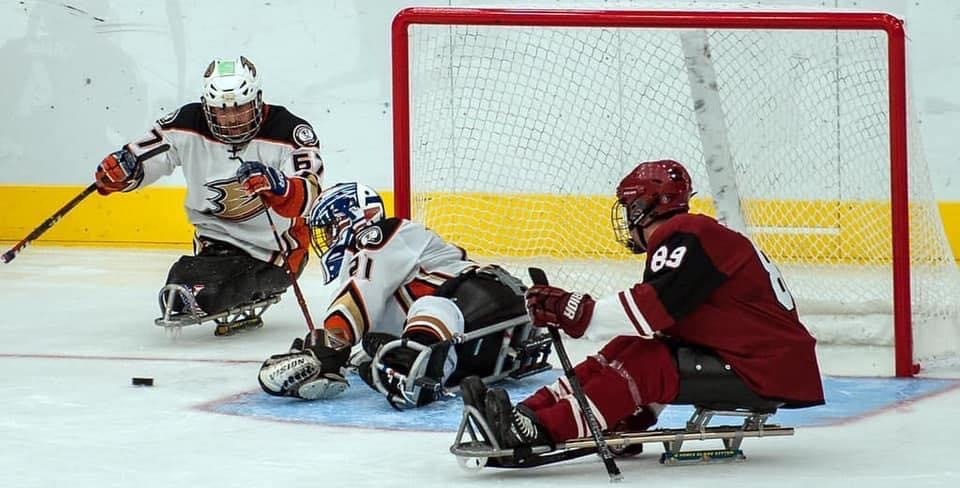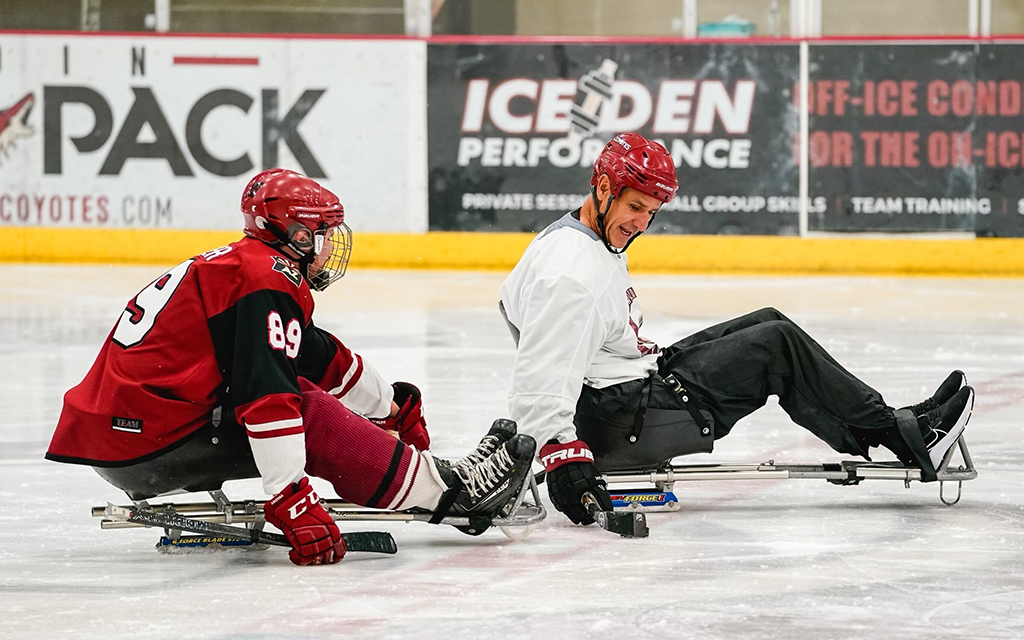
Coyote Sled Hockey members come together as a team during practice, exuding a spirit of unity and teamwork. (Photo by Joshua Grommer)
SCOTTSDALE – The character of an ice hockey rink is unmistakable.
The sound of skate blades digging into the ground, the cool air and the smell of ice are easily recognizable to all hockey players, regardless of their background or skill level. These enduring sensations stay with athletes long after their playing careers are over, becoming memories they take away from the sport they love.
It’s the passion for ice hockey that keeps Coyote Sled Hockey members coming back to the team. The team is open to all players with mental and physical disabilities. While the differences from regular hockey are subtle, members are able to compete at a high level while still having fun and being active.
Founded in 2001, Coyote Sled Hockey has grown significantly throughout its 23-year existence and is currently a member of the Pacific Sled Hockey League. In addition to competing in various tournaments throughout the year, the organization regularly plays against other sled hockey teams across the Western United States, including Las Vegas, Seattle, Los Angeles and New Mexico.
The best part is the league is committed to creating an inclusive environment.
“We welcome everyone as long as they show up and give it a try,” said Joshua Grommer, executive director of the Coyote Sled Hockey Association. “It’s good for everybody and it’s hard for everybody. Everyone that tries shows up and has a really good time. So, our team is made up of people with a variety of disabilities. Some have chronic illnesses, some have lost limbs, some have spinal cord injuries. People with a range of disabilities.”
A member of Coyotes Sled Hockey since 2017, Grommer is currently a player, coach and organizer. Grommer played non-disabled hockey throughout his childhood, but was diagnosed with lupus, a chronic autoimmune disease, in 2008 and suffered a stroke six years later. The attack left his left leg non-functional below the knee and prevented him from ever playing competitive hockey again.
At least, that’s what he thought.
Throughout his recovery, Grommer realized he needed to stay active and turned to Darling Adventures, a nonprofit that connects people with disabilities with adaptive sports. The organization introduced Grommer to Coyote sled hockey, and after attending his first summer clinic, Grommer was hooked.

Coyote Sled Hockey Executive Director Joshua Gromer (right) shows off his skills on the ice despite his physical disabilities. (Photo by Joshua Gromer)
“Once I tried it, I loved it and I’ve been going ever since because it reminds me so much of able-bodied hockey,” Grommer said. “You’re in the locker room with the boys, the rules are the same, the hockey IQ is the same. Obviously the mechanics are different, but it was a really nice reminder.”
Gromer’s condition is by no means uncommon: According to the Centers for Disease Control and Prevention, one in four American adults has some kind of disability, and 12.1% have serious trouble walking or climbing stairs. While disabilities primarily affect the body, they can also negatively impact an individual’s mental health.
But the frustrations of people with physical disabilities go beyond simply struggling to complete everyday tasks or being unable to play the sports they love. Disabled people often lack the fulfillment that comes from being part of a team or a community. Social limitations, loneliness, isolation and sometimes a lack of holistic care make them more likely to experience a range of mental health problems, from depression to post-traumatic stress disorder.
These are some of the problems Coyote sled hockey is trying to solve. Even if players decide to give it a try, there’s an adjustment period. Ultimately, there’s no other sport quite like sled hockey. Players essentially sit on a two-bladed, bucket-like sled and move forward using two sticks with metal picks on the ends, while also using the sticks to handle, pass and shoot the puck.
Several team members likened the way sled hockey is played to the rowing machine at the local gym, only more difficult. Sled hockey is a sport that has a significant learning curve, but once you’ve mastered it, it can be rewarding, but it can also cause players to regret their decision to take up sled hockey.
“I was nervous,” utility player Jim Widen, who has suffered multiple spinal injuries playing hockey, said of his first practice with Coyote Sled Hockey. “It was like the first day of school. You look around, you make eye contact, you bond with some of the people. After the first or second practice, you’re like, ‘These guys are so awesome.’ We’re all pretty much going through the same experiences. We’re all different, like apples and oranges, but we’re still all the same fruit.”
It’s natural to feel nervous on your first day trying out a new and challenging concept — Coyotes legends like Shane Doan routinely struggle the first time they get on the sled, much to the laughter of Coyotes sled hockey — but newbies quickly get used to the fun atmosphere on the rink.
The easy-going atmosphere at practices and games is the norm at Coyote sled hockey, and it’s appealing to forward Matthew Alexa. Born with spina bifida, which occurs when the spine and spinal cord don’t form properly, Alexa was given a sense of belonging and a new community when he joined the team earlier this year.
“I think it increases motivation and reduces stress,” Alexa says. “It definitely lowers my stress levels. It makes me want to work harder and makes me feel like I can do anything, not just on the ice, but in the rest of my life. I think I’m more motivated off the ice.”
Grommer described the mechanics of sled hockey as “unnatural,” but playing hockey on a sled isn’t normal either. It requires a separate conditioning process to make sure the sled is comfortable and moves smoothly before the players hit the ice. That’s where coach Steven Ortiz’s expertise comes in.
Originally from San Jose, California, Ortiz started in the wheelchair accessibility business 14 years ago and has extensive experience using technology to help people with physical disabilities get around. Ortiz played hockey for 14 years as a child and discovered sled hockey locally, so when he heard about Coyote Sled Hockey he knew he had to get involved.
So Ortiz took over as coach in the fall of 2023. In addition to providing insight behind the bench, he has been a valuable asset to the team, using his knowledge of accessibility to ensure players are comfortable in the sled.
“I spend a little bit of time before practice starts,” Ortiz says, “I usually get there about an hour early and get the guys set up on their sleds. I line them up, talk to them, get them on the sled before they go on the ice and make sure they’re balanced. I just make sure the process is smooth and comfortable.”
With a consistently positive atmosphere, a competitive schedule and travel issues easily resolved, the members of Coyote Sled Hockey have thoroughly enjoyed the big league experience, but without the support of the Arizona Coyotes, who operated in the Valley, it would not have been possible to establish and maintain a well-run program.
Their relationship began to blossom about four years ago, according to Coyotes director of hockey development Zach Savage, and while some of the events the team participates in are run through USA Hockey, the majority of the program is supported by the Coyotes.

Coyote Sled Hockey players have a variety of disabilities, including amputees and spinal cord injuries, underscoring the team’s mission of inclusivity. (Photo by Joshua Grommer)
The Coyotes Foundation provides all the tools the team needs to be successful, including providing extra staff to run practices, paying for travel expenses and providing new uniforms so the team looks as official as possible, and the support system for Coyote Sled Hockey quickly expanded as former NHL players quickly wanted to contribute.
“They run a grant-making style,” Savage said, “and as soon as the first grant was awarded, the alumni said, ‘We want to get involved, we want to provide additional funding so they can continue to do their work.’ And so over the last few years we’ve been putting resources into it, whether it be coaching, extra gloves, resources that we have in the community. We’re starting to put all these different things into it to really enhance the experience.”
With the Coyotes recently sold for $1.2 billion and set to relocate to Salt Lake City for the 2024-25 season, the future of Coyote Sleds hockey is unclear. Alex Merullo, owner of the now-defunct franchise, has pledged to continue his support of youth hockey in the Valley region, but what does that mean for other organizations that were counting on the team’s survival?
There are no clear answers at this point, and Coyote Sled Hockey is ready to adjust to reality without its largest financial backer.
But the team’s relocation won’t change the impact the organization has had on so many lives. Coyote Sled Hockey has helped several athletes with physical disabilities find a way to continue playing the sport they love while providing them with more than just a fun time. It has given them confidence and proven that they can be successful in life no matter what label they’re given.
“For me, (being part of a community) has been such an eye-opener because I felt so alone,” Grommer said. “Before I started this, I tried to join support groups, but it just felt like a bunch of people sitting around and feeling sorry for themselves. So by doing this, we’re doing something and we’re working together to achieve it.”
“But it really opened my eyes to the fact that some of these people have had disabilities since before I was born. And they’re thriving, they have families, they have jobs. That’s really inspiring, because when I started playing hockey I didn’t have kids and I couldn’t work, but now I run a business and have two kids. I think a lot of that is down to this group.”

